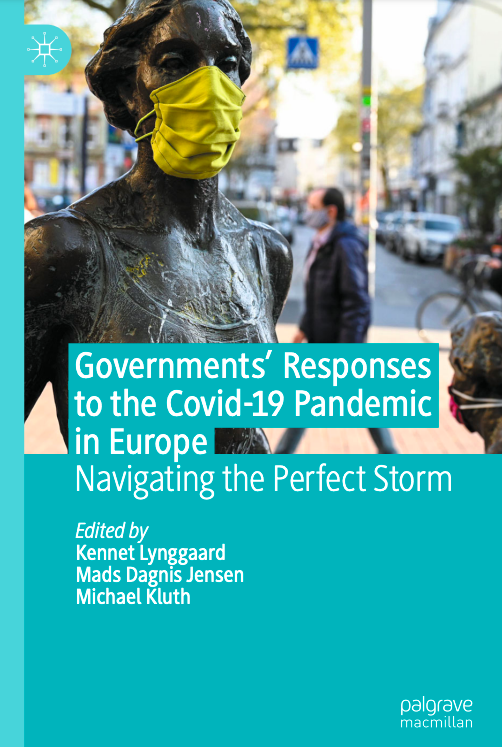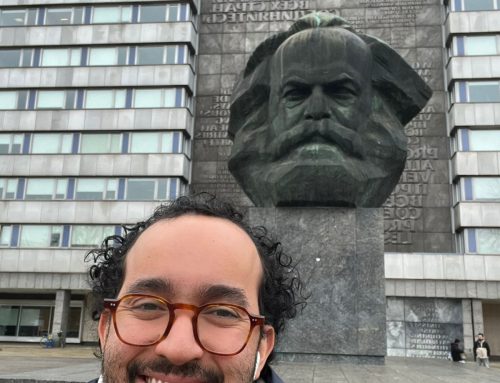On Friday, February 3rd, 2023, at 12 PM (CET) we are hosting the online book launch for Governments’ Responses to the Covid-19 Pandemic in Europe: Navigating the Perfect Storm, with a focus on South-Eastern Europe.
Join Zoom Meeting:
https://us02web.zoom.us/j/81886893572?pwd=YVY5a2pjb0RjZnlKYzBiNTJoaktRdz09
Meeting ID: 818 8689 3572
Passcode: 657974
About the Book
The Covid-19 pandemic erupting in 2020 represented the perfect storm for national political systems. The crisis that emerged in the wake of the pandemic was multifaceted in nature. It fundamentally tested political institutions, political processes and public policies. The book sets out to map European governments’ responses to the Covid-19 pandemic and explore similarities and differences.
This event will focus on four South-East European countries treated in the book: Bulgaria, Romania, Slovenia and Croatia. We will be joined by the authors of the four country chapters as well as by the book’s editors.
Speakers
Authors: Dr. Dimiter Toshkov, Dr. Danica Fink-Hafner, Dr. Sergiu Gherghina, Dr. Tena Prelec, Dr. Sanja Bojanić
Editors: Kennet Lynggaard, Michael Kluth
Bulgaria
Swift Early Response by the Executive, Followed by a Complete Governance Failure

In the early stages of the spread of the pandemic, Bulgaria was one of the first countries in Europe to introduce restrictive measures. This included a school closure followed swiftly by a complete lockdown. But complacency and governance failures eventually led to bungled policy reactions throughout the second part of 2020 and 2021.
Consequently, Bulgaria was the country with the lowest vaccination rate in the EU at the end of 2021. It also had one of the highest cumulative death tolls from the pandemic.
About the Author
Dimiter Toshkov is Associate Professor at the Institute of Public Administration, Leiden University. His main fields of research are European Union politics, comparative public policy, and research methodology.
Slovenia
Ripe for Autocratisation

About the Author
Danica Fink-Hafner is a professor of political parties, interest groups, and policy analysis at the Faculty of Social Sciences of the University of Ljubljana and head of the political science research program at the same faculty. Recent publications include: Delphi method: strengths and weaknesses (with Tamara Dagen and Mitja Hafner Fink), Metodološki zvezki (2019). Party fragmentation, the proportional system and democracy in Slovenia (with Meta Novak). Political Studies Review (2022). Interest Group Strategic Responses to Democratic Backsliding (with Sara Bauman) in Politics and Governance (2023).
With the pandemic looming, the implosion of the center-left governing coalition opened up space in March 2020 for the establishment of a new government led by Janez Janša (Slovenian Democratic Party). Janša is known for promoting Slovenia’s “second republic” based on ideas akin to Orban’s authoritarian political ideas.
Janša government’s responses to the pandemic largely focused on the economy. This led to change on the macro level—changing the system of government from a democracy towards an authoritarian style of governing.
While the circumstances allowed the new government to limit citizens’ rights and alter the political system’s practical functioning, a mix of state and non-state actors have been working to counter the second republic project’s success.
This policy priority may have allowed for a short-term curtailing of economic costs. However, the move towards authoritarian rule has overall impacted negatively on the management of the health crisis.
Romania
Inconsistent and Unpredictable Policy Implementation

About the Author
Sergiu Gherghina is Associate Professor in Comparative Politics at the Department of Politics and International Relations, University of Glasgow. His research interests lie in party politics, legislative and voting behavior, democratization, and the use of direct democracy.
Romania’s reaction to COVID-19 was characterized by sharp contrasts between the initial measures and subsequent developments. The country reacted swiftly in March 2020 and launched a State of Emergency to curb the virus spread. Called for the first time since the regime change in 1989, this procedure limits citizens’ constitutional rights.
The country was among the first EU Member States to close schools and borders, ban public events, suspend the activity of restaurants and non-essential shops and impose movement restrictions on the population. However, one year and a half later the country had many deaths and a high rate of infections. Similarly, the vaccination campaign started very well in January 2021, with clear planning. Still, in less than one year the country was second last in the EU in terms of the vaccinated share of the population.
These apparent paradoxes are explained through the disempowerment of experts, inconsistent actions, and limited predictability of policies in Romania throughout the pandemic.
Croatia
Breaking Fragile Trust


Croatia managed to contain the infection in the spring of 2020, but reopening to facilitate tourism has led to a spike in cases in early summer and very high infection rates in the autumn–winter.
This chapter traces the perceived politicization of the handling of the crisis and explains how this led to a breakdown of citizens’ trust in the government. The perception that the lifting of restrictions was linked to early parliamentary elections—won resoundingly by the ruling party—and aimed at capitalizing on the good early handling of the crisis led to lower trust in government.
This was later deepened by scandals concerning the flouting of rules by political and business elites.
About the Authors
Tena Prelec is a Research Fellow at the Department of Politics and International Relations (DPIR) of the University of Oxford. Additionally, she is a Region Head at Oxford Analytica and holds affiliations with LSEE-Research on South Eastern Europe, European Institute, London School of Economics and Political Science (LSE), as well as the Centre for Advanced Studies at the University of Rijeka. Furthermore, Dr. Prelec is a member of the Academic Freedom and Internationalisation Working Group (AFIWG), of the Balkans in Europe Policy Advisory Group (BiEPAG), and a Marshall Memorial Fellow, German Marshall Fund. She obtained her PhD from the School of Law, Politics, and Sociology, Centre for the Study of Corruption, at the University of Sussex.
Sanja Bojanić is executive director of CAS SEE UNIRI. She is a researcher immersed in philosophy of culture; media and queer studies, with an overarching commitment to comprehend contemporary forms of gender, racial, and class practices, which underpin social and affective inequalities specifically increased in the contemporary societal and political contexts. Studying philosophy, she tailored her interests at the University of Paris VIII, where she obtained an M.A. in Hypermedia Studies at the Department of Science and Technology of Information, and an M.A. and Ph.D. at Centre d’Etudes féminines et d’etude de genre. This process ultimately led to interdisciplinary research based on experimental artistic practices, queer studies, and particularities of Affect Theory. Her research and scientific work are fostered through projects funded by EU Commission and private foundations. Author and editor of several books and manuals. She published over thirty peer-reviewed papers on topics related to her field of expertise.
About the Editors

Kennet Lynggaard is Associate Professor at the Department of Social Sciences and Business, Roskilde University, Denmark. His research focuses on European politics and governance, research design, and the role of symbols, myths and emotions in European integration. Author of Discourse Analysis and European Union Politics (Palgrave Macmillan). Co-editor of Research Methods in European Union Studies (with I. Manners and K. Löfgren, 2015) (Palgrave Macmillan). He has published in numerous journals, including Journal of European Public Policy, West European Politics, Journal of Common Market Studies, Political Psychology, Regulation & Governance, New Political Economy, Comparative European Politics and Journal of European Integration.

Michael Kluth is Research Director and Associate Professor at the Department of Social Sciences and Business, Roskilde University, Denmark. His research focuses on European Security Collaboration, Comparative Politics, Public Procurement, European Political Economy and Europeanisation. He has published in various journals, including West European Politics, European Security, European Politics and Society and European Foreign Affairs Review.

Mads Dagnis Jensen is Associate Professor at the Department of International Economics, Government, and Business at Copenhagen Business School, Denmark.





